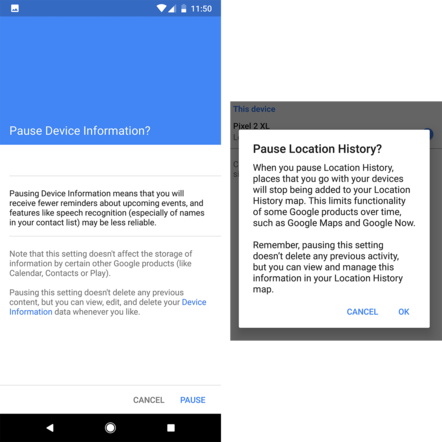This article is more than 1 year old
Why the 'feudal' tech monopolies run rings around competition watchdogs
Rather than break up Google, can we try owning our data?
It's not OK to be a monopolist
In some ways, Google and Facebook are doing what BT did, succumbing to the same temptations to monopolise, says Cowen.
"If you're Google or Facebook and have a low variable cost and a high fixed cost, it's always more efficient to provide your services over your own platform. That's just the nature of the economic position you're in.
"To be found dominant is one [way] of saying that you're more efficient – but efficiency is not a defence. It's just saying it's OK to be a monopolist. But it's not – it undermines creativity, innovation and market development."
The European Commission's Android case cites restrictive mobile application developer agreements (MADAs) for phone makers, ensuring Google's own products are seen first. The shopping case, in which Google also promoted its own products, also seems a straightforward example of bundling to Cowan.
Unpicking this shouldn't be difficult.
"The United States had a problem in 1970s with airlines promoting tickets to the airline reservation system. So if you were an agent and searched for a flight from Orlando to Detroit, say, American Airlines would come up first. The average travel agent was going to book the one at the top of the page." The solution came in 1984, with regulations outlawing screen bias (PDF).
What about breaking up Google? Cowen and Blond stop short of this. Because the Bell AT&T breakup didn't work?
Not really, he says. Judge Greene's break up of AT&T was the wrong remedy, Cowen told us, it instead created seven regional monopolies.
"The Baby Bells wouldn't provide access to anybody. It was in their interest to quibble about everything while keeping prices high. Greene just created a structural monopoly and allowed it to pillage its customer base."
Instead he advocates horses for courses. If breaking up a giant monopoly is the only course of action left, it should be considered.
"The remedy should be proportionate to the problem, you should look at current law to solve the problem." The current remedies in the EU shopping case with Google don't seem to be effective. "What they've done on shopping is provide a remedy of sorts which clearly isn't working. Google says there's a gradual increase in traffic to competitors, from 3 per cent to 5 per cent, but what Google is saying 97 per cent or 95 per cent of shopping traffic is still going to Google."
Isn't the argument that we need protection itself a bit paternalistic? we asked. Surely everyone using Google knows the deal: they're giving away privacy for cheap phones or services and are quite happy with it.
Cowen has a giggle.
"It's clear it's not free – you're being harvested for your data. So we're all being farmed for data. This is the first step on the road to serfdom, to use Hayek's phrase." But surely people are happy with that.
"Maybe they'd be happy in a feudal society too. They'd know their place. You get to muck things out. You get paid. Not much, though."
More transparent contracts, and encouraging a trade in personal data offers two constructive ways out, Cowen argues.
"I don't know how my valuable my personal data is today, because Google and Facebook are doing the monetising. Elsewhere we intervene on one-sided consumer contracts. We give people a 14-day cooling off period, for example. We've got lots of consumer protection – because we recognised consumers are smaller and have less power than the supplier. We can do the same here."
"I never signed a set of contracts terms with Google," he points out, as it's hidden in hundreds of pages of legalese in a click-through licence.

Google is obsessed with your location. If you turn it off, Google will turn it back on again
I recently floated the idea that at boot time an Android phone would have to present the user with a ballot of, say, location providers. Google polices that location monopoly fiercely, and aggressively turns Location History back on when you go to a new device.
But with a first-boot location ballot, I mused: "You could then choose who it went to, and those location services would have to compete for your data. Perhaps they'd give you rebates to go with them. There'd be an instant market for your data – and if they squirted it to a third party they'd lose you."
Cowan has been thinking along the same lines. The status of ownership of data is not currently clear and needs to be clarified.
"If you had ownership of data you'd have a more balanced trading relationship. An aggregator can help redress the balance." ®


